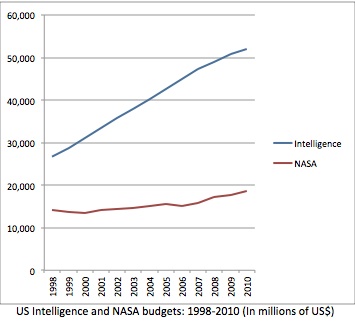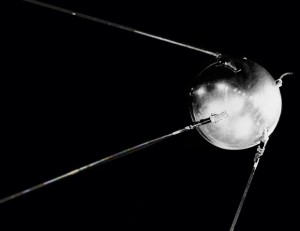On July 8, 2011, the National Aeronautics and Space Administration brought the second phase of America’s 50-year history of manned space flight to a close. The final flight of the space shuttle left NASA incapable of putting astronauts into space, forcing them to bum rides from their old competitors, the Russians.
NASA recently released a new proposal to develop a new heavy-lift booster rocket that could put America back into space by the end of the decade. The price tag, somewhere between $35 and $62 billion over the next 15 years. According to the Wall Street Journal, White House officials are worried that Congress’s current anti-debt hysteria will make it difficult to get funding for this new endeavor passed.
NASA spending generally pays for itself a dozen times over through new technology. It serves as a world-wide reminder that America can do great things for all mankind. It inspires new generations of scientists. It’s generally a good idea, so yeah, Congress will probably cut it.
That’s why it’s such a shame that NASA passed up an incredible opportunity to guarantee funding. “The biggest mistake in the history of NASA” wasn’t Bruce Willis. It happened this week in the press.

This is a Hubble telescope image of a gas cloud from the Carina Nebula. It's more than three light-years tall. I don't care what your political views are - that's cool.
Last weekend, the Weinstein Co. released Apollo 18, a “found footage” horror film most simply described as “the Blair Witch on the moon.” SPOILER ALERT In it, moon spiders that can disguise themselves as rocks manage to kill the astronauts from our last, secret, moon shot. According to most reviews, it’s pretty terrible. (Rotten Tomatoes score of 18%. 4% lower than the Smurfs). But that doesn’t matter. What matters is the advertising.
Like the Blair Witch Project, Apollo 18 was advertised as a documentary that featured real footage of a deliberately covered-up mission. You’d think that America would know better than to look for truth in movie trailers by now, but NASA disagrees. In an interview with the LA Times, NASA’s Bert Ulrich made a point of saying that: “Apollo 18 is not a documentary. The film is a work of fiction, and we always knew that.”
NASA collaborates with hundreds of filmmakers every year. They’ve partnered with Pixar to have WALL-E teach kids about space, they helped produce 1986’s Space Camp (the single greatest false advertisement ever made), and they even signed off on Transformers: Dark of the Moon, the other summer movie about aliens on the moon.
For some reason, NASA felt the need to distance themselves from Apollo 18.

Strangely, this astronaut is currently performing an extra-vehicular activity (EVA). In the next scene, they dance.
Huge mistake.
They should have admitted that the footage was real.
Imagine, for a second, America’s reaction to the news that there are murderous space spiders on the moon. Within a week, the House Republicans would have condemned President Obama’s failure to act quickly to protect us from the space spiders. Democrats would have countered that the spiders were discovered during the Nixon Administration. One thing we could all agree on: let’s give NASA whatever it wants to protect us from these bastards.
The equation they forgot is one of the most basic in American politics: FEAR = FEDERAL FUNDING. Since the tragedy of September 11, 2001, the budget for America’s intelligence services has nearly doubled to $52,000,000,000 per year. The Homeland Security budget went from $0 in 2001 to $43,000,000,000 last year. Some people think those expenses are justified. Others don’t. Regardless of your opinion, those numbers tell you that when America is afraid, we’re willing to spend.
NASA, you had a massive ad campaign telling people that you found monsters in space – the one thing that could have guaranteed your funding forever – and you shot it down. Did not one of you read Watchmen?
 But, my friends, there’s still time. If you didn’t lie to us once or twice before finally admitting that the footage was real, we probably wouldn’t believe it.
But, my friends, there’s still time. If you didn’t lie to us once or twice before finally admitting that the footage was real, we probably wouldn’t believe it.
Make a deal with the Weinsteins, who would love to make more than the $8.7 million they banked in opening weekend. Get their footage transferred onto punch cards or whatever you were using in the early 70s. Have some intern go find an old filing cabinet full of records from the early seventies. Take a black marker and redact almost everything. A little sheepish testimony before Congress and before you can say National Aeronautics and Space Administration, you’ll have every dollar you need to put us back in space.
Do it for America. Do it for the future. Do it for all the nearsighted, out-of-shape, liberal-arts majors who still believe that we’ll be astronauts one day.


The hitch is that any such admission would explode the heads of every NASA single engineer just from the movie’s bad science alone, to say nothing of the plot and acting.
The really weird part is that NASA will cooperate with basically ANYBODY who wants to make a movie about space. In 1978 there was a movie called Capricorn One, about how NASA fakes a Mars landing. NASA not only gave them permission to use all the logos, they donated a whole bunch of equipment to the production. And that’s a movie that portrays the agency as a bunch of charlatans.
By the way, how’s this for an interesting cast: the three astronauts pretending to go to Mars were James Brolin, OJ Simpson, and Sam Waterston.
http://hijinksensue.com/2011/09/02/houston-we-have-plausible-deniability/
“NASA spending generally pays for itself a dozen times over through new technology”.
Source, please.
One of the sustained criticisms of NASA is the squandering of money in relation to needs here on earth. There aren’t a whole lot of useful spin-offs from NASA: it’s a little bit like justifying military spending that is 2-3 times per capita spending in other OECD countries by citing spin-offs from military spending.
Oh I bet you could think of a few, Richard. How about starting with just the technologies you relied on to post that comment? You know, like integrated circuit designs and telecommunications satellites?
“Source, please.”
I didn’t run a very rigorous search, but this one seems good enough:
http://gizmodo.com/5061120/50-consumer-technologies-developed-by-nasa-in-the-last-50-years
And while the entire list of specific technologies escape me, I do believe the space program improved/ refined some and made them more accessible or popular. I mean, c’mon, wouldn’t the world be a little messier and less joyful without Teflon and Tang?
And the rest of your comment: I’d venture that even if we don’t use it on Earth, if other countries buy the technology for their own programs, the U.S. still gets those payments- and then, at least in theory, those monies could, indeed, go toward something on the ground.
w/e, the money don’t exist, either America readjusts its priorities, get some fiscal sanity, or face a Roman like collapse.
That hypothesis has been tossed about in academic writings for a few years now.
Without public spending on technology, infrastructure and public works, and without a strong partnership between the public and private sectors, there would have been no Rome to begin with.
The collapse of the Roman Empire from its height took longer than the entire history of the United States.
And the Roman Empire went through public funding crises and monetary crises orders of magnitude bigger and crazier than anything the United States has gone through since the establishment of the dollar.
The two things aren’t comparable at all. And the money is there – NASA’s budget has never been very big.
Fiscal sanity involves manageable debt and reliable funding. Fiscal insanity is drumming the spoon against the pot and calling for the reworking of the whole darned system every election cycle.
Carthago delenda est.
We really need a “like” button.
I am ambivalent about a “Like” button, but Fenzel is and remains my favorite Overthinker :)
I love a) that you would make that joke and b) that this a place where a lot of the audience is going to get it. We don’t need more politicians who insert their opinion on a completely different subject into every debate, but if they do it with Cato the Elder’s panache, that’s another matter.
Every journey starts with a first step, even tumbling down a flight of stairs. Of course American Imperialism needs to be on the chopping block, but there is only so much that could be cut (some argue that the national security state is about $1.2 trillion and about 50-60% is expendable with a less aggressive foreign policy). If I recall correctly, letting the Bush tax cuts lapse on the top 1% would generate another $75bn a year, over 10 years. So that is about $750bn a year by just making those two adjustments (and when I say the national security state there are some non-DoD and DHS items included). When the Federal deficit is year over year more than a trillion dollars, such measures alone are only going to slow down the debt, not cut it. So what else could be cut to get Uncle Sam out of the red? Besides the war on drugs, the farm subsidies and some other tax reforms (which will probably hurt “the rest of us”), NASA and its multi-billion dollar budget should be on the chopping block.
As for technology and Rome, let’s be honest, most “scientific” advances were developed by other cultures or creative persons using their own fortunes or patronage of other powerful people in Roman culture. Now if you meant the roads and public buildings of Rome, yes they were the product of public money, mostly, but comparing NASA to road work and civic buildings seems a bit of a stretch.
Publius: Maybe in conjunction with those bigger, ballsier moves, cutting NASA isn’t so bad.
But the problem is NASA is getting cut when it’s a grain of sand amidst a bunch of bricks. I know I’ve brought it up before, but look at this picture from Bill Maher’s show, representing the budget. He first started doing this when NPR and Planned Parenthood were on the chopping block- and reference this a lot because it’s a very simple and visual analogy:
http://zealouslymoderate.files.wordpress.com/2011/02/tumblr_lgui3xxw6p1qz82gvo1_500.jpg
Unseen behind the chicken and taters are a few tiny veggies, a pea and a carrot or some kinda jazz. NASA is like one of those peas. And getting rid of one of those peas and calling it good is, SPOILERS!, not going to fix the diet of America.
So I see your point, and, ideally, what you want would work- because, ideally, the big ticket items like the chicken breast and the taters will be fixed. But those tax cuts are probably not going to lapse; defense is not going to be cut (likely the opposite, in fact); those farm subsidies are practically holy relics; etc.- but, politicians are still going to cut things that are trivial to the budget on the pretense of “doing something” about the situation. And they’re going to keep pumping money into other, useless programs because of how pork barrel politics work- for example, Senator A would never vote to decrease a budget for defense that would lower R&D if that money goes toward a Boeing facility in their district because then Boeing would have to fire people; meanwhile, the Joint Chiefs have released a report saying that money is no longer necessary for suchandsucha reason. On the national scale, maybe those people would have to lose their jobs, but it would save a couple billion dollars for the federal budget. So yeah, it’s a question of balance and morals, and “all politics is local” and all that kinda jazz; but the reason the politicians keep doing it that way is, from the cynical perspective, because they’re more focused on reelection than actually doing some good for society. Senator A would protect those jobs not because they care about their constituents, but because they care about how those constituents vote. Now, there are, of course, myriad theories as to why politicians do as they do, but even in academia, that’s one of the most prevalent ones. And it vexes me. I’m terribly vexed.
So, to end this circumlocutious rant, NASA getting cut vexes me for reasons beyond my nerdery. It vexes me because it’s a stupid item to cut, given the big picture. And because there are people that believe it when they’re told symbolic cuts do more than generate warm fuzzies, thereby enabling the practice to continue.
(For the record, Publius, I don’t think we’re in much opposition- I’m ranting at the system, and I think we’d both like to see it go in the same direction, ultimately. But as Fenzel said, it’s a system of fiscal insanity.)
Gab,
That was a very thoughtful and thorough response, that I completely respect and with which I generally agree. I find the hilarious thing a recent poll by the Reason Foundation (a libertarian think-tank) found a majority of both tea partiers and non-tea partiers both believe the no taxes approach is wrong headed. http://reason.com/blog/2011/09/13/55-percent-of-americans-believ. I would venture a similar percentage of Americans feel the same way about the national security state, in whole or in part. So really who the hell are the politicians representing?
Thanks for the compliment. I know it was long- if I was a superhero, my superpowers would be of verbosity and circumlocution; my opponents would get so tired of me talking, they’d turn themselves over. And my arch nemesis, in the four-volume-super-special, would give me laryngitis. ;p
Anyhoo, to figure that out, you’d need to compare a regression of “responsiveness” to public opinion with ones having to do with campaign contributions and the like and see where the stronger coefficients ended up. That’d be the simplest way I’d know about. I’m bad at quantitative methods, though, I’m more theory/qualitative-oriented. And no doubt somebody has already published an article about that or presented it at a conference. I’m just too tired and lazy to look for it right now.
And I now shall refrain from ranting further, this time about _The Federalist Papers_ and elite theory.
Final thoughts:
LOL! to even mention further analysis of the statistics by political controbutions to Tea Party Caucus representatives/senators show you are an overthinkingit master. Even if in this circumstance it is just a cogent look beyond the statistics (the third category of lies).
NASA-Industrial-Complex ftw.
“The Homeland Security budget went from $0 in 2001 to $43,000,000,000 last year.” Did someone misplace a whole column of zeroes, or is the US spending tripple its entire deficit on that department?
With that minor nitpick out of the way, how could you not use a picture of the Spider Nebula (http://www.news.wisc.edu/news/images/Spitzer_spider_nebula05.jpg) for the article?
Stephen,
While I’ll grant that I missed a great opportunity in failing to use the spider nebula photo, I’m pretty sure that $43,000,000,000 is $43 billion. The national debt is $14.7 trillion and the federal deficit is $1.3 trillion. $43 billion may only be about 4% of the deficit, but it’s still a obscene amount of money to spend on plastic bins and groping.
As for cutting spending and such, sure, we can cut back on things like the space program and save a few bucks, but that’s an awfully short-term strategy. The long term strategy: taxing people with money.
Bill Gates has $56 billion. Had NASA not developed integrated circuits (thanks, jjsaul), he would not have made $56 billion. We could tax Mr. Gates at a rate of 98% and he would still be a billionaire. Meanwhile, we’d have $55 billion, more than half of what we need to fund NASA’s new projects. And one day, down the road, the next Bill Gates can live like Scrooge McDuck while paying his 98% towards our next great exploration.
Either we go with that or we invade and pillage a neighboring country with a lot of natural resources.
Canada delenda est.
Just for clarity, I didn’t mean to credit NASA with the invention of integrated circuits, but with many, many design breakthroughs.
Really, it’s like arguing evolution though. I just can’t bring myself to accept that anyone arguing to stop looking upward has any perspective on 1) the scale of limitation that restricts us while stuck dicking around on this dustmote and 2) the fact that what’s up there will eventually wipe us out if we stay here.
We can’t keep crapping the nest forever.
Mc Niel, if we taxed Bill Gates 98% of his income, he would just leave the country, and the national income would DECREASE by the amount of money that he was paying. In short, persecution of a specific group of citesens, especially through overtaxation, leads to one of two things, A) open revolution (if you want an example, America), or B) they leave the country, causing a complete reversal of what you are trying to do. Of course, Bill Gates wouldn’t be the only thing leaving, either. If he leaves, so does a large portion of Microsoft, meaning yet another blow to our tiny molecule of an economy, rampant unemployment increase, and let’s not forget all the other “greedy” rich people. America was founded on one truly great ideal, freedom, freedom to speak your mind, to be able to do what you want, and the right to own what is rightfully yours. You are taking the Obama approach, of SOCIALISM, which is, and always will be, anti-American. The American dream and CAPITALISAM are so completely intertwined that it becomes impossible to see where one stops and the other begins. It may not be law, but the United States Declaration of independence CLEARLY states that no nation that infringes upon the rights of the people it is meant to serve should be allowed to exist. If such anti-American policies were EVER to go into effect, even I (sadly, the most patriotic person that I know) would GLADLY take up arms to abolish them. Such a comment as yours belongs onUnderthinkingit.com, not this website, for it is clear that you did not, in fact, think at all, because anybody that did think would never have voiced such naïve and ignorant opinions. Believe whatever you like, but next time, think it over, first. I am sorry I went on a rant, but this needed to be said. I must express my deep sorrow that it was not said sooner, I thought that I knew the proud members of overthinkingit.com, I see now that I was wrong, my condolences.
I knew the sentient rock thing sounded familiar…without the stupid bit about spiders. Which I do understand a lot of people are afraid of but people are also afraid of the dark and loud noises which isn’t a lot to base a movie on. Here, part of fenzel’s Avatar post.
“One thing Sheely and I did agree on – Avatar would be a lot more interesting if the aliens were like people in the important ways, but unlike people in superficial ways – like if they looked like rocks and didn’t appear to move much, but were individually sentient and communicated and built relationships with each other through speech or vibration.”
http://www.overthinkingit.com/2010/01/13/6-reasons-avatar-sucks/4/
So…in a way…they made that movie. Only without the “existential problems of being rock aliens” of course.
Every time I come back to this thread to see a new comment, and see the sentient rock reference, I keep thinking the same thing.
I have to say it.
“It’s a rock! It doesn’t have any vulnerable spots!”
“You’ll need to make a weapon. Look around… can you construct some sort of rudimentary lathe?”
“You have a last name!” “DO I!?”
“Maybe you’re the plucky comic relief?”
Nasa does pay for itself over and then some. My mate who got to work at Nasa for the summer said that the kind of tech they use, just in data analysis, electronics and computing alone, its far beyond even the best oxbridge (oxford/cambridge universities) equipment. He had to sign a NDA that meant he was not allowed to speak or talk about the tech he used for 10 years. so yeah, they make a ton of stuff that is highly prized. And yes, he snuck a couple programs out